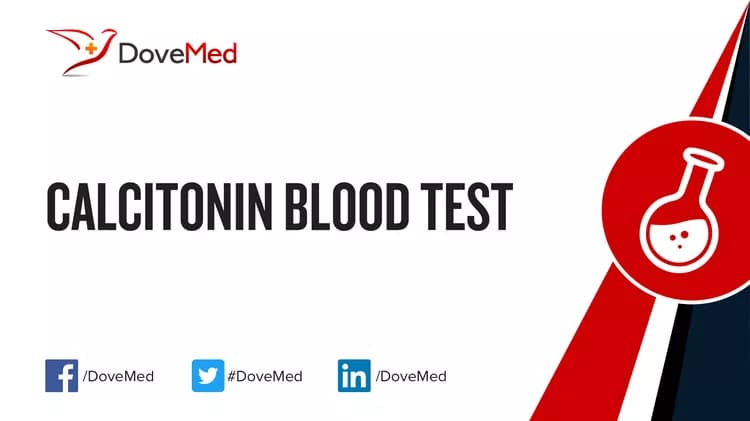What are the other Names for this Test? (Equivalent Terms)
- Thyrocalcitonin Test
What is Calcitonin Blood Test? (Background Information)
- Calcitonin Blood Test measures the level of hormone calcitonin in the blood
- The hormone calcitonin is secreted from the thyroid gland, an endocrine gland (a hormone-secreting gland) located in the area of the throat, against the windpipe. Special cells, called C-cells present in the thyroid gland, secrete calcitonin
- Calcitonin Blood Test is mainly used to screen, diagnose, monitor, and evaluate the response to treatment for medullary thyroid cancer (a highly cancerous, spreading form of thyroid cancer)
- The normal levels of calcitonin are less than 10 pg/mL (picogram per milliliter)
What are the Clinical Indications for performing the Calcitonin Blood Test?
- Calcitonin Blood Test is ordered in cases when the healthcare provider suspects the presence of medullary thyroid cancer (a thyroid cancer type). Medullary thyroid cancer account for 3-4% of all thyroid cancers
- Other types of thyroid cancers include papillary carcinoma of thyroid, follicular carcinoma of thyroid, lymphoma of thyroid, and anaplastic carcinoma of thyroid. The blood calcitonin levels are not a useful measure with these cancers
- If medullary thyroid cancer is diagnosed and treatment started, the test is then ordered at regular intervals, to evaluate the effectiveness of treatment. It is also used to monitor the return of cancer, following treatment
Some of the signs and symptoms associated with medullary thyroid cancer are:
- Swelling or lump in the thyroid gland
- Hoarseness or change of voice
- Pain in the neck
- Difficulty swallowing, breathing
- Persistent cough, cough with blood
- Diarrhea
This test may also be ordered in some other conditions with elevated calcitonin levels, such as:
- C-cell hyperplasia: A benign (noncancerous) form of thyroid gland lesion, which may or may not progress to medullary thyroid cancer
- Some neuroendocrine tumors of the lung and gastrointestinal tract, which may abnormally secrete calcitonin hormone from the tumor cells
- Chronic kidney (renal) failure
- Sepsis, which is infection in the blood, can potentially infect any organ in the body
- Pancreatic cancer and rare pancreatic tumor, called insulinomas and VIPomas
- Medullary carcinoma of breast, which is a specific type of breast cancer
How is the Specimen Collected for Calcitonin Blood Test?
Sample required: Blood
Process: Insertion of needle into a vein (arm).
Preparation required:None, other than overnight fasting that may be required by some laboratories, prior to the test. Some medications may interfere with the test results; hence, the healthcare provider should be informed about all current medications taken, before the test.
What is the Significance of the Calcitonin Blood Test Result?
Significance of the Calcitonin Blood Test:
- Low levels of calcitonin correlate well with the absence of medullary thyroid cancer or C-cell hyperplasia
- Low levels of calcitonin in treated cases of medullary thyroid cancer, signify an effective treatment
- Significantly high levels of calcitonin, especially along with clinical signs and symptoms are highly predictive indicators of medullary thyroid cancer. This means that the likelihood of a medullary carcinoma is high. The healthcare provider will also use other lab tests and investigations to establish a definitive diagnosis of medullary carcinoma of thyroid
- High levels may also indicate C-cell hyperplasia, or other conditions as mentioned above
- However, if the levels are elevated after treatment, or if the levels begin to rise after remaining low for some time, it usually means that either the treatment is not fully effective, or that the cancer has returned
Additional and Relevant Useful Information:
- Calcitonin is sometimes given as a prescription to inhibit bone resorption and release of calcium from the bones. It stimulates calcium uptake by the bone
- Some drugs, such as oral contraceptives, epinephrine, etc. increase the calcitonin levels. Calcitonin levels are also normally higher, in newborns and pregnant women
Certain medications that you may be currently taking may influence the outcome of the test. Hence, it is important to inform your healthcare provider, the complete list of medications (including any herbal supplements) you are currently taking. This will help the healthcare provider interpret your test results more accurately and avoid unnecessary chances of a misdiagnosis.
Related Articles
Test Your Knowledge
Asked by users
Related Centers
Related Specialties
Related Physicians
Related Procedures
Related Resources
Join DoveHubs
and connect with fellow professionals


0 Comments
Please log in to post a comment.